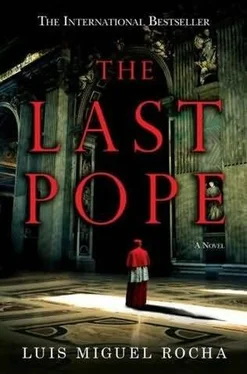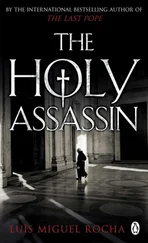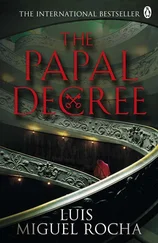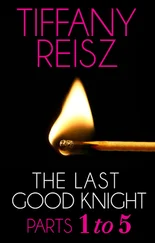Rafael and Sarah were sneaking through a restricted-access doorway. Her heart began beating much faster. “He’s close.”
“Did you know it’s said that the height of this monastery is the same as its depth underground?” she asked nervously.
“I’m sure,” Rafael answered mechanically, obviously thinking about something else.
They went into what had once been a hospital, with an adjoining chapel, from which the patients could hear the Lord’s words. In one corner, Rafael skillfully opened a small wooden door.
They descended a narrow spiral staircase, illuminated by the flashlight Rafael had pulled out of his pocket.
“It’s also said that the basements have been inaccessible for centuries, due to the thousands of rats living there.” Sarah’s voice sounded tremulous, revealing her anxious jitters. “Countless treasures were lost because of that.”
They came to a very old door with rusty hinges and moldy wood. There was utter darkness. Sarah began picturing bats awakened from their sleep, infuriated by the two intruders. Rafael opened the door, which screeched sharply.
“Watch your head,” he warned, stooping to go through the narrow doorway. Sarah followed him, convinced she was about to enter fifteenth-century Portugal.
“What is this? Where are we?”
“Take this,” Rafael said, handing her the small flashlight.
Sarah grabbed the chance to survey the place, disregarding Rafael’s moves. But the only thing she managed to see was dirt. Dirt and more dirt. She couldn’t tell if it was a continuation of the passageway or a kind of catacomb.
“Would you mind pointing that over this way?” Rafael asked. “It has to be somewhere around here.”
“What?”
Set in the rock, or dirt wall, Sarah couldn’t tell, was a stick with a cloth wound around one end. A primitive torch.
Seconds later, using a lighter, Rafael ignited it. The fire spread an orange light that partly lifted the darkness. Before them was an enormous tunnel that looked endless, dug out of the rock.
“Where are we?”
“Welcome to the catacombs of the Mafra monastery,” Rafael said, noticing Sarah’s bewildered expression. “Shall we go?”
Sarah didn’t answer for a moment, stunned into silence.
“My father’s coming to meet us here?” she finally asked.
“No, your father lives here.”
GOLF AND MONEY MATTERS SEPTEMBER 1978
There’s certainly nothing like the blue smoke of Havana cigars. It traces beautiful, unpredictable swirls, slow-moving and soulful, and their fragrance permeates rooms with an incomparable, refined elegance.
Paul Marcinkus was savoring a Havana cigar in his Rome office, while watching the television recap of a round of golf. Just at that moment, while an elegant golfer in a yellow jersey competed in the tournament against the all-powerful Jack Nicklaus, a bitter workday was coming to an end. Only the Masters at Augusta or the British Open could soothe life’s troubles. Although there’s nothing like Wimbledon, of course. he thought
False holiness made the Illinois archbishop sick, and he couldn’t understand certain cardinals’ disgust with life’s pleasures. “Holy rubbish!” was his usual response when some humble priest reminded him that the Church’s elaborate display wasn’t exactly the best model for the world’s faithful. In those cases, even if the observation came from a member of the Curia, Archbishop Marcinkus reminded them of a passage from the Gospels that always disarmed his opponents. “The Son of man, who ate and drank, came, and people said, ‘This is a gluttonous drunkard, friend of sinners and carousers.’ But his deeds bore witness to his wisdom.” Luckily for him, the prelates reproaching him never mentioned the passage where Jesus warned that one could not serve two masters, particularly if one of them was God and the other gold.
“That’s a three-iron,” Marcinkus said, when the RAI commentator didn’t know which club the golfer was using.
Pope Paul VI entrusted him with the directorship of the Vatican ’s finances in 1971, when he was only forty-seven. Marcinkus could still remember the ailing pope’s admission, after Vatican Council II, that the coffers of the Holy See were full of cobwebs. It was a divine mission, Marcinkus thought, grinning ironically. The institute for religious works, the IOR, really housed distinct financial organizations that needed updating and renovation.
One of the first modern banking institutions depending on the Holy See was the Banco Ambrosiano, founded by Monsignor Tovini in 1896. That financial entity, as Marcinkus read in various old reports, was intended to “support ethical organizations, beneficial work, and religious groups devoted to charity.”
“Naturally,” the cardinal said out loud, remembering that one of the former Banco Ambrosiano directors had been a nephew of Pope Pius XI. “Charity matters most.”
During the 1960s the Banco Ambrosiano moved its central offices to Luxembourg, a country that worshiped money. “Small countries are such delights: Luxembourg, Monaco, Andorra, the Vatican, the Bahamas.” In Luxembourg, Banco Ambrosiano Holding was formed, with its beneficial work being diversified around the world.
The smile on Marcinkus’s face showed he was thinking of those pleasant sixties, when Michele Sindona, incomprehensibly labeled the Mafia’s banker, began to develop friendly ties with Roberto Calvi. According to the cardinal, Sindona was not a terribly clever man. He had been arrested in the United States, and found guilty of illegal financial activities in Italy. But as for Calvi, Marcinkus could only find him worthy of admiration. Based on that, strong ties developed between the IOR and the Banco Ambrosiano. Marcinkus decided, through a series of high-finance maneuvers, to absorb the Banca Cattolica del Veneto, then headed by an ignorant cleric named Albino Luciani. Marcinkus had to make a superhuman effort to recall his brief, and acrimonious, exchanges with the Venetian patriarch at that time. And, years later, when Luciani was elected pope, Marcinkus assumed the Venetian had his mind set only on revenge. Now he had been able to prove he was right. Luciani had accused a good number in the Curia of moral corruption, and intended to make a clean sweep in the heart of the Church. Fortunately, the P2 was taking care of that at this very moment.
Because of Marcinkus’s efforts, the Church was saved, thanks to his connections with big names in finance, thanks to the pious men who had advised him well. There was nothing wrong with obtaining high profits and, in addition, collaborating in various charitable works.
But Albino Luciani didn’t see it that way. He didn’t understand anything. In all those years, he had learned nothing. And he had threatened to destroy them all.
At that moment, on television, Nicklaus putted for a birdie, and the ball went smoothly into the hole.
“Brilliant! Brilliant!”
The jet cut through the air at top speed, at an altitude above 42,000 feet.
The cabin on this plane was like the passengers’ London office, with people going back and forth, some giving orders, others bent over computers, talking on the phone, engaged in an endless variety of tasks no different from the ones they performed on land. The only difference was that they couldn’t go out for coffee, and they had to adjust to a few minutes’ rest inside the aircraft. They were confined, seat belts fastened, only during take-offs and landings.
In heaven as on earth. Geoffrey Barnes still had a separate office from the rest of his crew, with a luxurious leather chair.
Thompson proved to be a good recruit. He served himself coffee in the director’s office and sat on a chair considerably less comfortable than Barnes’s.
Читать дальше












